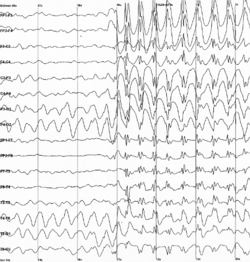Seizure: Difference between revisions
>Oskykins m Text replacement - "===See also== *Responsible use=" to "===See also=== *Responsible use" |
>Josikins m Text replacement - "stimulants" to "stimulants" |
||
| Line 2: | Line 2: | ||
An '''epileptic seizure''' (colloquially a '''fit''') is a brief episode of signs and/or symptoms due to abnormal excessive or synchronous neuronal activity in the brain.<ref>Epileptic seizures and epilepsy: definitions proposed by the International League Against Epilepsy (ILAE) and the International Bureau for Epilepsy (IBE) | http://www.ncbi.nlm.nih.gov/pubmed/15816939</ref> The outward effect can vary from uncontrolled jerking movement (tonic-clonic seizure) to as subtle as a momentary loss of awareness (absence seizure). The disease of the brain characterized by an enduring predisposition to generate epileptic seizures is called epilepsy,<ref>Epileptic seizures and epilepsy: definitions proposed by the International League Against Epilepsy (ILAE) and the International Bureau for Epilepsy (IBE) | http://www.ncbi.nlm.nih.gov/pubmed/15816939</ref><ref>ILAE official report: a practical clinical definition of epilepsy | http://www.ncbi.nlm.nih.gov/pubmed/24730690</ref> but seizures can also occur in people who do not have epilepsy. | An '''epileptic seizure''' (colloquially a '''fit''') is a brief episode of signs and/or symptoms due to abnormal excessive or synchronous neuronal activity in the brain.<ref>Epileptic seizures and epilepsy: definitions proposed by the International League Against Epilepsy (ILAE) and the International Bureau for Epilepsy (IBE) | http://www.ncbi.nlm.nih.gov/pubmed/15816939</ref> The outward effect can vary from uncontrolled jerking movement (tonic-clonic seizure) to as subtle as a momentary loss of awareness (absence seizure). The disease of the brain characterized by an enduring predisposition to generate epileptic seizures is called epilepsy,<ref>Epileptic seizures and epilepsy: definitions proposed by the International League Against Epilepsy (ILAE) and the International Bureau for Epilepsy (IBE) | http://www.ncbi.nlm.nih.gov/pubmed/15816939</ref><ref>ILAE official report: a practical clinical definition of epilepsy | http://www.ncbi.nlm.nih.gov/pubmed/24730690</ref> but seizures can also occur in people who do not have epilepsy. | ||
This can occur due to a variety of causes and is common during withdrawals from prolonged chronic [[benzodiazepine]] usage or during an overdose on certain substances such as [[ | This can occur due to a variety of causes and is common during withdrawals from prolonged chronic [[benzodiazepine]] usage or during an overdose on certain substances such as [[stimulant]]s, [[Cannabinoid#Synthetic_cannabinoids|synthetic cannabinoids]] and the [[25x-NBOMe]] series of [[psychedelics]]. | ||
===See also=== | ===See also=== | ||
*[[Responsible use]] | *[[Responsible use]] | ||
Revision as of 09:32, 27 April 2016

An epileptic seizure (colloquially a fit) is a brief episode of signs and/or symptoms due to abnormal excessive or synchronous neuronal activity in the brain.[1] The outward effect can vary from uncontrolled jerking movement (tonic-clonic seizure) to as subtle as a momentary loss of awareness (absence seizure). The disease of the brain characterized by an enduring predisposition to generate epileptic seizures is called epilepsy,[2][3] but seizures can also occur in people who do not have epilepsy.
This can occur due to a variety of causes and is common during withdrawals from prolonged chronic benzodiazepine usage or during an overdose on certain substances such as stimulants, synthetic cannabinoids and the 25x-NBOMe series of psychedelics.
See also
- Responsible use
- Subjective effects index
- Psychedelics - Subjective effects
- Dissociatives - Subjective effects
- Deliriants - Subjective effects
References
- ↑ Epileptic seizures and epilepsy: definitions proposed by the International League Against Epilepsy (ILAE) and the International Bureau for Epilepsy (IBE) | http://www.ncbi.nlm.nih.gov/pubmed/15816939
- ↑ Epileptic seizures and epilepsy: definitions proposed by the International League Against Epilepsy (ILAE) and the International Bureau for Epilepsy (IBE) | http://www.ncbi.nlm.nih.gov/pubmed/15816939
- ↑ ILAE official report: a practical clinical definition of epilepsy | http://www.ncbi.nlm.nih.gov/pubmed/24730690